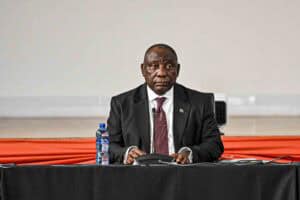His backers closed ranks around him yet again, fending off the final attack.

This is a sobering moment for South Africa, as many of us contemplate, with trepidation, a future for all of us under President Jacob Zuma’s empire.
On Sunday night, after perhaps the strongest move yet to oust him as president of the country – and leader of the ANC – the cunning old survivor gave clear notice that reports of his political demise had been greatly exaggerated.
His backers closed ranks around him yet again, fending off the final attack, which came via a motion of no confidence tabled at the party’s national executive committee meeting in Pretoria.
This means many things – ominous things – for our country.
Firstly, Zuma will continue to lead the ANC until December, and the country until he steps down in 2019.
This will be despite the almost overwhelming weight of allegations (much of which emerged over the weekend) that he and his fellow travellers in his circle, his family and the Gupta network, are continuing to conspire to capture the state for their own greedy ends.
The enrichment of the few at the expense of the many – something which has characterised the Zuma administration – will continue.
Expect more revelations of gorging at the government or parastatal trough. Expect more jobs-for-pals appointments – although experience has shown us these jobs will not be mere resting places, they will be utilised as part of the greater game of state capture.
Expect more moves to make the legal system more pliable and less likely to challenge the Zupta juggernaut.
Then, there will be the expected negative impacts on our economy – and on every single citizen – of the Zuma future.
We have already seen how the rand depreciates on bad political news, and that trend is likely to continue, the fancy words of Finance Minister Malusi Gigaba notwithstanding.
Those negative financial implications are likely to be reinforced by what will undoubtedly be an acceleration in the campaign to show that Zuma is at the forefront of “radical economic transformation” and heading the divisive battle against “white monopoly capital”.
Most sobering, though, is the reality that the opposition – both inside and outside the organisation – has been soundly defeated.
This has implications for those touted as alternatives to Zuma, including Deputy President Cyril Ramaphosa.
The ANC has made it clear it backs Zuma and, therefore, that it will help him establish and cement a Zuma dynasty through his ex-wife, Nkosazana Dlamini-Zuma, who now takes an almost unassailable lead in the race for the top job.
Worryingly, the battle to remove Zuma has left deep collateral damage. After he had warded off the no-confidence motion, Zuma hit out at opponents for criticising him in public, warning them “not to push me”. He also claimed that he was being targeted by “foreign powers”.
That sort of divisive comment and paranoia has, elsewhere in Africa, led to detention without trial, extrajudicial killings and persecution and, in some cases, the demise of an entire democracy. We do not believe South Africa will go that way, however.
There are too many who sacrificed to liberate the country and who will not swap one dictatorship for another. In a global age of technology and flourishing commitment to democracy, those are the voices of our freedom.
Long may we continue to hear them.
ALSO READ:
//
For more news your way, follow The Citizen on Facebook and Twitter.
Support Local Journalism
Add The Citizen as a Preferred Source on Google and follow us on Google News to see more of our trusted reporting in Google News and Top Stories.






